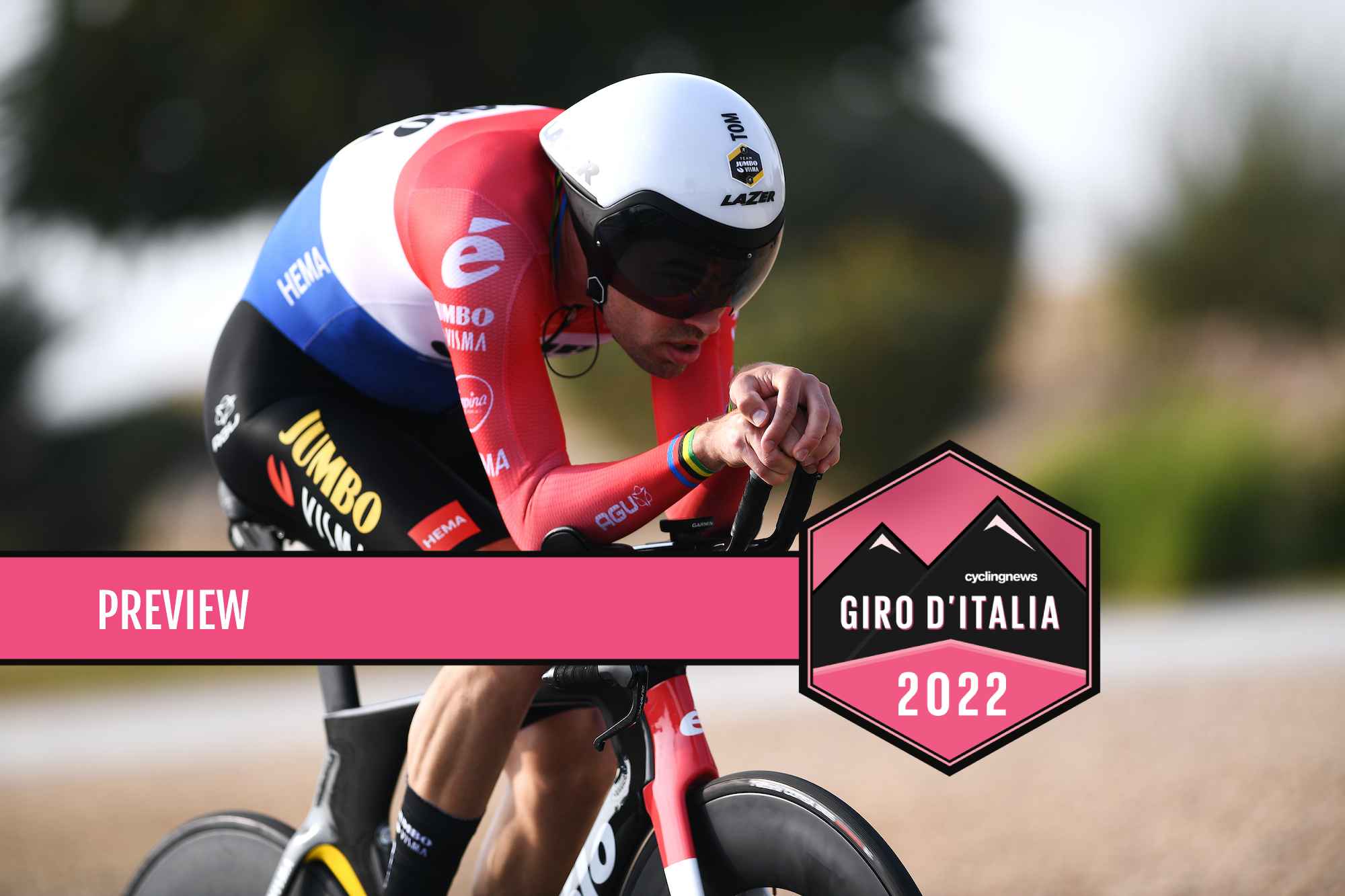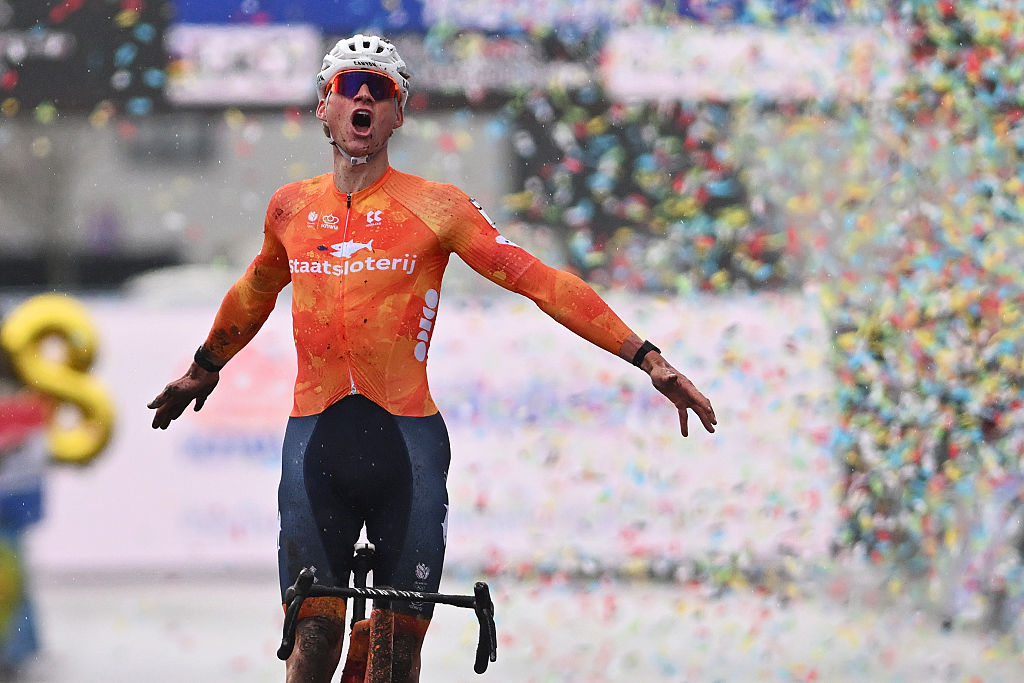Preview: Tricky urban stage 2 time trial tests Giro d'Italia contenders
Summit finish and training time limitations render Budapest TT 'anything but straightforward'

After Friday’s breathless uphill finale, the challenges keep on coming in the 2022 Giro d’Italia with a short, punchy time trial through the streets of Budapest set to test the contenders on Saturday afternoon.
And just like Friday’s stage 1 finish at Visegrad, Saturday’s 9.2-kilometre race has a real sting in the tail. This comes in the shape of a final 1.3-kilometre climb, steepest at the bottom, with a stretch at around 14%, and then dragging steadily upwards at a much less challenging 3.5% to the finish line in Szentháromság square.
The addition of the climb makes a seemingly innocuous-looking short TT anything but straightforward, Israel-Premier Tech’s Alex Dowsett, a former Giro d’Italia time trial winner and former World Hour Record holder, tells Cyclingnews.
“As a city centre time trial, it’s automatically quite technical. But it’s going to be much more difficult with that uphill finish, with some cobbles on the climb, too,” Dowsett said. “I’m looking forward to it though, I like the look of it.”
Asked why it’s so much more difficult than a climb-free time trial, Dowsett draws comparisons with Tirreno-Adriatico’s traditional TT finish at San Benedetto del Tronto, held over a similar distance to Budapest.
“At Tirreno, it’s flat, fast, basically quite a simple aerodynamic test,” Dowsett explains. “This Giro TT is going to be more about bike handling. Also, the city roads with technical corners can make it much tougher and much less one for the pure TT racers. So, we could see some gaps.”
It’s not just riders’ bike handling skills that will be under scrutiny on Saturday, either. The winding final climb will make it difficult to calculate how much energy to put out on the flat and how much to leave in the tank.
The latest race content, interviews, features, reviews and expert buying guides, direct to your inbox!
“A lot will depend on how fast you can approach the final climb, because while it’s steep, it’s short, so you can take it at speed that’s basically half of the climb done for you,” Dowsett pointed out. “Then it’s all about hanging on to the top.”
Short as it is, Budapest represents a voyage into the unknown in other ways. As an urban circuit with roads open to busy traffic throughout the working week, the chances for riders to do a full on-site reconnaissance will be limited to Saturday morning.
From a time triallist’s point of view, that’s a pity because according to Dowsett, no matter how many times you recon a course, there is truly no upper limit regarding how much you can learn about it – and shave off seconds or fractions of seconds at different points in the process.
But before the ‘road closed for training’ signs go up on Saturday morning, “if you want to attack that climb at full tilt [during your training ride], there’s no way you can do that before. And if you want to see how fast you can go on the corners, you can’t do that either,” Dowsett pointed out.
“Plus there’s the effect of things like the barriers going up fully and the crowds being there on how you take corners and so on.
“So I’ll do a good recon in the morning and riding it for a couple more laps than you’d usually do is worth it for sure."
"But,” he added with a grin, “I don’t want to give too much away to the opposition. The bottom line is, if you go in blind you’re going to lose time.”
Further adding to the unpredictability of Saturday’s time trial is that historic references for this kind of course are limited.
Looking purely at similar previous opening weekend Giro TT courses of recent years, Bologna’s ascent to the Madonna di san Luca sanctuary on stage 1 of 2019 was over a very similar distance of eight kilometres. But that course had a much harder finishing climb, so comparisons are of limited value.
A closer parallel is maybe the more rolling stage 1 individual TT in Jerusalem in 2018, won by a certain Tom Dumoulin. But that 9.7-kilometre course contained a severely technical mid-race climb and then a tough final ascent. So again, only so many lessons can be learned from four years ago and on Saturday the riders will be facing something of a voyage in the dark.
One curious coincidence with much more recent Giro and cycling history is that just like Friday’s finish, the stage 2 time trial also concludes high above the River Danube, albeit in a city centre and not outside a castle deep in rural Hungary. Given the stage 2 TT also contains a final climb with certain similarities to a Tour of Flanders berg, perhaps a certain recent De Ronde winner could also claim back to back stages in this Giro’s opening long weekend.
Speaking before Friday’s stage 1 and Mathieu van der Poel’s victory in Visegrad, Dowsett ticks off names of potential stage 2 winners as including “Tom Dumoulin, [João] Almeida, Jos Van Emden … Jumbo have got quite a few guys.”
As for his own chances, it’s no secret that Dowsett's taken a step back from time trialling in past years. But once a tester always a tester and on top of that with the TT coming at the start of the race, Dowsett's energy levels are at full, too: all in all Saturday is too good an opportunity for him to resist having a go.
“I still love time trialling – the art of trying to go fast, it’s a passion. I’m excited about it,” he says. “I wouldn’t want to sit here and say ‘I’m confident’, but I’m excited to give it a good bash. In the Tirreno TT this year" – where Dowsett claimed fifth on stage 1 – “I surprised myself and I’m trying to take that relaxed attitude into tomorrow.”
But the pressure to succeed is not high, he emphasises. “If I do a good ride, great. If not, that’s not why I’m here at the Giro.
“But I’ve had some upgrades on the bike, its weight has come down drastically, so I’m hopefully going to do OK.”
Alasdair Fotheringham has been reporting on cycling since 1991. He has covered every Tour de France since 1992 bar one, as well as numerous other bike races of all shapes and sizes, ranging from the Olympic Games in 2008 to the now sadly defunct Subida a Urkiola hill climb in Spain. As well as working for Cyclingnews, he has also written for The Independent, The Guardian, ProCycling, The Express and Reuters.

